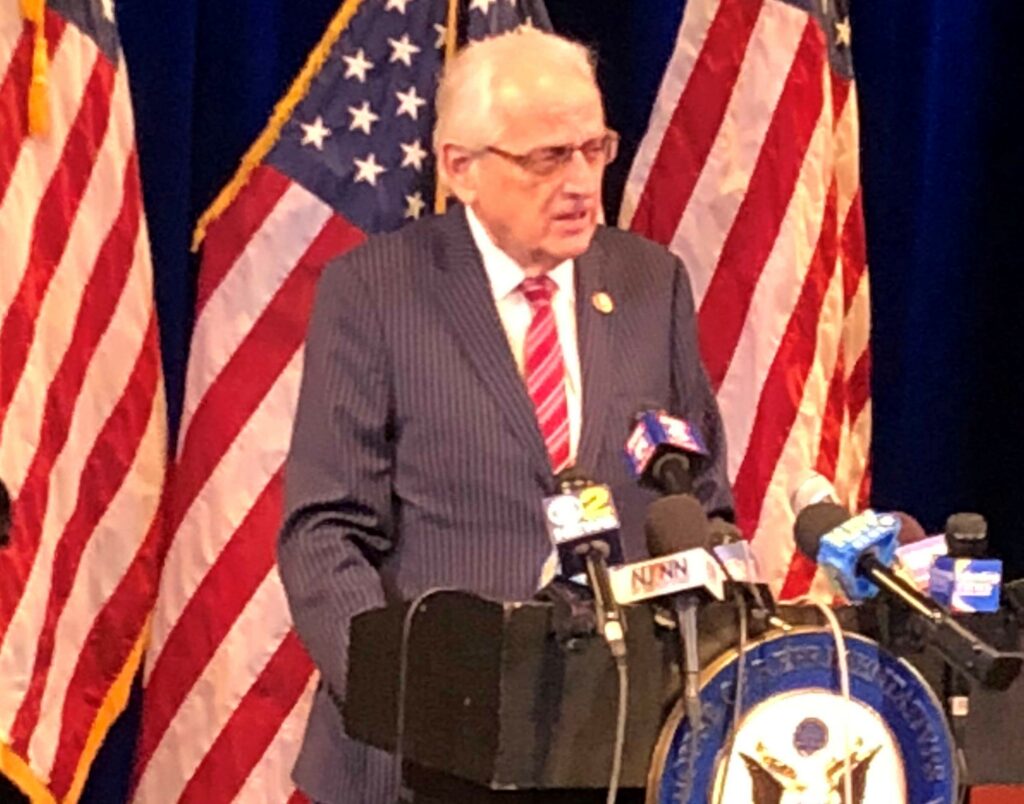Pascrell Rejects Pearl Jam Criticism of BOSS Act

Pascrell Rejects Pearl Jam Criticism of BOSS Act
Comprehensive legislation is necessary to fix live events market, provide protections to fans
PATERSON, NJ – U.S. Rep. Bill Pascrell, Jr. (D-NJ-09) today responded to a letter the band Pearl Jam sent to House Energy and Commerce Committee Chairman Frank Pallone, Jr. (D-NJ-06) and Ranking Member Greg Walden (R-OR-02) opposing Rep. Pascrell’s H.R. 3248, the Better Oversight of Secondary Sales and Accountability in Concert Ticketing (BOSS Act), landmark legislation to fix the corrupted live events ticket market.
“For decades now, millions of American fans who want nothing more than to enjoy a little entertainment for their buck have been victimized by the opaque live events marketplace,” said Rep. Pascrell, Congress’s leading voice for regulation of the ticketing industry. “Fans have been pinched, gouged, squeezed, soaked, and outright heisted by a seemingly endless litany of hidden fees, add-ons, and gimmicks created by the unregulated ticket monopolies who operate in the dark with impunity. My bill would be the first comprehensive overhauling of this corrupt marketplace. Music and sports fans have waited long enough for relief. Pearl Jam may know a thing or two about making great music, but they’ve been led astray about my legislation. I would be happy to speak with the band about why Live Nation-Ticketmaster doesn’t care about their fans and wants to preserve a corrupt marketplace.”
Congressman Pascrell has been a leader in Congress calling for regulation of the opaque live events ticket market. Pascrell was an early critic of the Live Nation-Ticketmaster merger, and repeatedly urged the Obama administration to reject it, warning that the union would crush competition and harm consumers. In May 2018, Pascrell wrote an op-ed in the Los Angeles Times on his attempts to impose greater positive regulation on the broken live events ticket market.
Two months later, Reps. Pascrell and Pallone wrote a letter to Federal Trade Commission chairman Joseph Simons highlighting a Government Accountability Office (GAO) study which found a myriad of consumer protection and competition issues in the primary and secondary live event ticket markets. The GAO report was commissioned in response to Pallone and Pascrell’s work, and the members urged Simons to do more to protect consumers in the marketplace. In response, the FTC organized a workshop on event tickets held in June 2019 to review many of the challenges faced by ticket-buying fans.
In September 2018, Pascrell was featured in the wide-ranging investigation by the Canadian Broadcasting Corporation into corruption in the live events ticket marketplace. Pascrell’s interview segment is available here, and the next month Pascrell wrote a letter to then-U.S. Attorney General Jeff Sessions calling for the U.S. Justice Department to open an investigation of continued market corruption by Ticketmaster.
Pascrell is the principal sponsor of the BOSS Act, overarching legislation that will impose a basic level of transparency to the ticket industry so fans have a fair chance to purchase tickets on the primary market and also seeks to protect consumers who choose to use the secondary market to purchase tickets. The legislation is currently being considered by the Energy and Commerce Committee. The BOSS Act’s components are detailed below.
Primary marketplace provisions
- Requirements for all-in pricing to ensure ticket sellers disclose all ancillary charges before customers select a ticket for purchase.
- Transparency in use of holdbacks.
- Restrictions on preventing reselling or instituting a price floor on tickets.
- Disclosure of refund policies.
Secondary marketplace provision
- Transparency in the sale of speculative tickets.
- Disclosure to purchasers when the secondary seller is the primary ticket seller, venue, team, or artist associated with the event.
- Requirements for all-in pricing to ensure ticket sellers disclose all ancillary charges in price quotes and advertisements before customers select a ticket for purchase.
- Prohibitions on employees of venues, primary ticket sellers, teams, artists, online resale marketplaces, or box offices involved in hosting, promoting, performing in, or selling tickets to knowingly resell tickets at a higher price.
- Restrictions on selling a ticket for the same seat to more than one person at the same time.
A full section-by-section breakdown of the legislation is available here.
###





